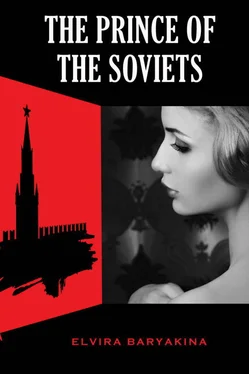Britain had cut off diplomatic relations with the USSR; France had expelled the Soviet ambassador; in Poland, the Soviet ambassador had been killed; in China, communists were hunted down like rabid dogs. Moreover, newspapers around the world were printing documents to prove that the Bolsheviks had carried out subversive action not only in Europe but also in Asia.
All this had been interpreted by the Kremlin as the “eagerness of the imperialists to stifle the new Soviet state,” and they were now preparing for a major war. It was vital too for the government to whip up war hysteria so that the Soviet people would rally around their leaders and don’t complain about the empty shops and queues for bread. It may have been peacetime, but now, ten years after the revolution that had promised prosperity for the working class, the country was back in the same state of economic crisis it had experienced in 1917.
Magda went to the department store to buy Nina warm clothes, but it turned out that she would have to pay forty rubles for a pair of ugly shoes with crooked seams, seven rubles for a pair of cotton stockings, and a hundred and fifty rubles for a winter coat.
“Remember, you told me that the average salary for a Moscow worker is seventy-five rubles a month?” Magda said, puzzled. “How do ordinary people manage?”
Nina sighed. “I wish I knew.”
They left the shop empty-handed, and Magda made Nina a present of a velvet coat she had brought herself as a souvenir in Peking. It was an enormous, bright red horror with a folded collar and dragons embroidered on the back.
“You can alter it as you like,” she told Nina. “You can’t go about without a warm coat, and it would be mad to buy one at Soviet prices.”
Nina worked on it for several days and transformed it into an elaborate but smart oriental-style cropped coat and a beret.
When she wore her new winter clothes, Nina was repeatedly mistaken for a participant in one of the fancy-dress performances staged to discredit the English. Young people from a propaganda brigade would wheel an enormous effigy of an Englishman about the streets of the city. From time to time, they would prop it on its knees, read some fiery, passionate speeches, and then begin to beat the cursed “Anglo-Saxon” over the head. Once, one of these Soviet youngsters even handed Nina a wooden mallet and told her to deal the effigy a blow on behalf of the Chinese insurgents.
Magda was trying to think how she could earn enough money to support herself. Every day, the Soviet papers and pamphlets brought into the Metropol carried announcements about how the USSR was planning to modernize its industry and how the country needed urgent help to acquire and develop the latest technology.
Magda wrote a short instruction book on soap making and asked Nina to translate it into Russian. But to her surprise, none of the publishers she approached offered her a contract.
“It’s an interesting topic,” the editor from the state publishing house, Gosizdat, told Magda, “but we need permission from the Administration for Literary Affairs.”
Elsewhere, she was asked for a piece of paper from the People’s Commissariat for Education, from the Supreme Soviet for Domestic Economy, or even from the OGPU.
“Do they think I’ve written something wrong?” fumed Magda. “They can submit it for scrutiny if they like. Let them send it to a specialist!”
“They won’t be submitting anything for scrutiny,” Nina said, wearily. “They just don’t want any problems with foreigners. Who knows? You could be a foreign agent or a saboteur. And if so, they’ll have to answer for it.”
Although Nina tried to convince herself that she had nothing to do with the Land of the Soviets, she felt ashamed in front of Magda on account of the publishers, the effigy of the Englishmen, and the ugly shoes on sale for forty rubles.
6
Nina was also trying to think of ways to earn money.
The All-Union Society for Cultural Relations with Foreign Countries was handing out free tickets to the Bolshoi Theater to the guests at the Metropol so that foreign visitors could get a taste of Soviet culture. But far from all of them were interested in going to the opera, and some were happy to sell their tickets to Nina.
They did not realize that the Bolshoi Theater was the bastion of Soviet high society. This was where the country’s elite gathered—the wives of people’s commissars, famous writers, and sometimes members of the Central Committee. Many Russians would give their back teeth for a seat in the stalls; as for a ticket for a box reserved for foreigners, it was nothing short of a passport to paradise.
Nina came back to her hotel room after concluding another successful deal with the ticket traders and spread out her profits on the bed. One hundred and thirty rubles—not a great deal, perhaps, but at least now she could sense a glimmer of hope on the horizon.
Tucking the money away into her knitted purse, Nina looked out of the window. The clock in the middle of Sverdlov Square said five o’clock. Where could Magda have got to?
Magda had begun gathering material for a book she was planning to write about the Soviet Union. She had already come to the gypsies who lived in Petrovsky Park, and on another occasion, she had visited a flophouse that was home to hundreds of criminals, prostitutes, and down-and-outs. Given her formidable size and strength, she had decided she had nothing to fear.
Darkness fell, and a light autumn rain began to drum against the window pane. Several times, Nina picked up the novel borrowed from the hotel library, but all her thoughts were of Magda. Where had she got to this time? To interview the cleaners of public toilets, or to attend a meeting of Trotsky’s supporters?
It was one in the morning when Nina heard heavy footsteps in the corridor followed by a knock at the door.
“H’llo—I’m back,” Magda said in a drunk voice.
She stomped damply across the room and fell onto her bed without taking off her boots or her coat.
“What’s the matter with you?” gasped Nina.
“Not with me. With Friedrich. He does care about me after all.”
Magda had found the Comintern Hostel, gained entrance in through the kitchens, and arrived in Friedrich’s room just in time for a celebration. The Party had forgiven him all his Chinese transgressions, both voluntary and involuntary, and appointed him pilot of a new passenger airplane.
“A Fokker-Grulich F II!” exclaimed Magda with relish. “Now Friedrich will be flying from Moscow to Berlin three times a week.”
Suddenly, she blanched, got to her feet, and rushed to the toilet. Soon, dreadful groans could be heard from behind the door.
Magda was in such a bad way that Nina stayed by her side all night. When Magda was feeling a little better, she began to describe her meeting with Friedrich, her voice full of affection.
“Tomorrow, there’ll be a parade in honor of the anniversary of the revolution. Friedrich has given me a special pass for the tribune, for important foreign guests. He told me it will be a military parade by the Red Army to show enemies—well, to show us , I suppose—that the Soviet people fear nothing. Oh, I need to go to the lavatory!”
Nina went to the floor manager and brought some clean towels.
“If you can’t hold your drink, you’ve no business drinking!” she scolded Magda. “Did you talk to Friedrich about your relationship?”
“We didn’t have a chance,” said Magda in a weak voice. “We—I mean Friedrich has had a hard time of it. He’s a loyal supporter of Trotsky, but he was forced to denounce him. He had to sign a document saying that the Chinese revolution was failed on account of the Trotskyites, who were part of a worldwide capitalist plot. Otherwise, he could have been sent to prison.”
Читать дальше












